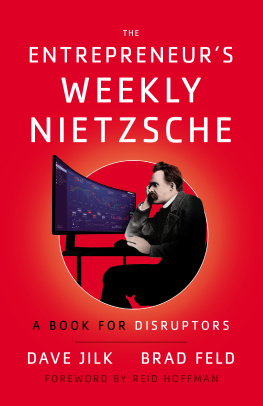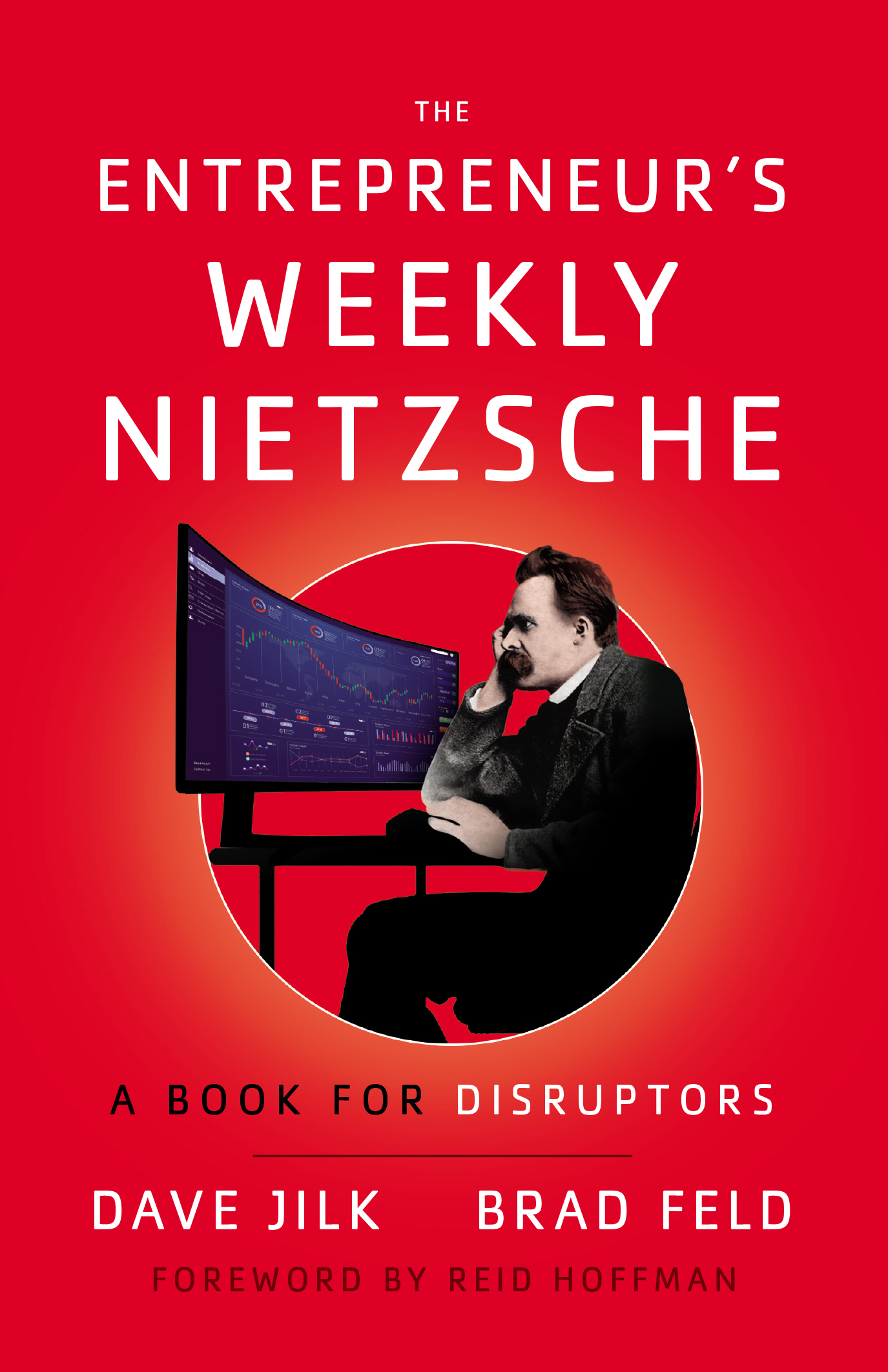The Entrepreneurs Weekly Nietzsche
A Book for Disruptors

DAVE JILK and BRAD FELD

copyright 2021 dave jilk and brad feld
All rights reserved.
the entrepreneurs weekly nietzsche
A Book for Disruptors
isbn 978-1-5445-2141-1 Hardcover
isbn 978-1-5445-2140-4 Paperback
isbn 978-1-5445-2139-8 Ebook
isbn 978-1-5445-2094-0 Audiobook
Cartoon illustrations by Neil Kohney
To our fathers, Stanley Feld and Dave Jilk, who gave each of us our first introduction to entrepreneurship, and who were willing to send us to MIT, where we began our friendship and collaborations.
Table of Contents

Foreword

Nietzsche is a troubling and troublesome philosopher. In different decades and contexts, even scholars have formed radically different interpretations of his work. Nietzsche lends himself to these conflicting interpretations because he philosophizes with an aphoristic hammer and an intense literary style. While the many subjects of his attacks are clear, the reasons and implications of his critique can lead to many different interpretations. Nietzsche deploys this approach in pursuit of bold originality and self-creation. This is what makes him such a good patron philosopher for entrepreneurs.
Entrepreneurs frequently seek to disrupt an industry by creating new products and services based on changing technologies and markets. Nietzsche sought to disrupt the philosophy of his day through stylistic aphorisms that challenged staid, traditional academic methods. Entrepreneurs develop their companies with new company cultures and new business models. Nietzsche developed his philosophy through a shift of frame, a metamorphosed question, a poetical imperative. Entrepreneurs compete by speed, originality, and strategyproviding modern solutions to classic problems. Nietzsche competed by tearing down old systems of philosophyreplacing old idols (values, religions) with modern humanity.
As Dave and Brad note in this book, Nietzsche himself dismissed commercial activity and those who engaged in it as crass and dully unambitious. Most of the businesspeople in his day, after all, were local shopkeepers and bourgeoisie, locked into the rote patterns and conventions of daily commerce. Whereas Nietzsche, in contrast, felt that the highest pursuit of the human soul was to seek human evolution: evolution of identity, of culture, of new mind. Even more specifically, evolution to absolute originality: the creation of the never-seen-before.
In these aspirations, Nietzsche encapsulates entrepreneurship. Build the new. Renovate institutions. View markets and customers as evolutionaryand join them in their evolution. Nietzsche was a disruptor, in the ways that entrepreneurs are also disruptors. Where philosophers and philologists studied the classics to honor and entrench history, Nietzsche wanted to cast down those idols to create a new philosophy. Where companies and industrialists have achieved a market position, they work to keep that industry and market roughly where it is. In contrast, entrepreneurs strive to revolutionize industries through new products and services based upon new technologies and alternative business models.
But beyond anointing an outstanding philosopher of entrepreneurship, why is this book important?
Nietzsche also looked forwardto what humanity could and should become: Ecce Homo (Behold the Man). In parallel, some of the best entrepreneurs are also great humanists. Since we often experience entrepreneurs first and foremost as capitalists or technologists, some may find this surprising. But thinking about who we are as humans and who we can become parallels how entrepreneurs shape the evolution of products, customers, and markets.
This is partially why philosophy can be fundamental to entrepreneurship. There are, of course, many entrepreneurs and businesspeople who think that philosophy is useless or worse. In this view, entrepreneurs and philosophers reside on opposite ends of a utility spectrum: entrepreneurs are pragmatic doers with common-sense theories designed to fulfill the actual wants and needs of the public they serve; philosophers generate grand but abstract theories that may be intellectually impressive but do not survive engagement with the world.
Surely there are philosophers who do lose the trees for the forest. But when you put thought and action together, you have a very powerful combination.
One of my favorite expressions is: in theory, there is no difference between theory and practice. The implication: in practice, there are significant differences between theory and practice. Nevertheless, both are critically important. Theory-driven practicewhere you improve your theory from practiceis the strongest approach. Philosophy teaches you how to think in general theories. Philosophy teaches you precision in thought and language. Philosophy teaches you how to construct a theory, test it for truth, and then evolve that theory. And so does entrepreneurship if youre doing it right!
Other disciplinesfrom physics to economics to psychologyfocus on more specific domains and teach you how to evolve theories in those domains. But philosophys generality is the attribute that makes it a preferred part of an entrepreneurs toolset. Entrepreneurs frequently are doing something original with their business: a new way of acquiring customers or engaging customers, a new technological platform, a new business strategy or operational approach, a new business model. These innovations generally escape current theories and frameworks, so they need new formulations to express them as goals, as strategies, as new systems. Philosophy provides the general terms to formulate a new theory.
Finally, philosophy mostly concerns itself with human nature. Philosophy is the love of wisdom, the pursuit of truth and knowledge. Theories of human nature underlie this pursuit: Who are we such that we seek truth and knowledge? What sorts of truth can we grasp? How do we act with respect to those truths?
I believe that a theory of human nature underlies every entrepreneurial pursuit. Who are we, such that we will want this new product or service over existing products and services? Who are we, such that this new means of acquiring customers will succeed? Who are we, such that we will remain deeply engaged with this new product or service?
Because I believe that entrepreneurial projects require a specific theory about human nature, I frequently start with a philosophical observation when I deliver public talks on investing. For example, for nearly two decades I have been saying that investing in the consumer internet means investing in one or more of the seven deadly sins. Business school students usually think that you become adept at investing by learning about concepts like Customer Acquisition Cost (CAC), Lifetime Value (LTV), operating margins, competitive differentiation, and so on. However, every entrepreneurial project targets a future CAC or LTV, so how do you get there? Who are we, such that we will stay engaged with this product at scale? Philosophy helps you think sharply about your theory of human nature and how it ties to your entrepreneurial goals.














